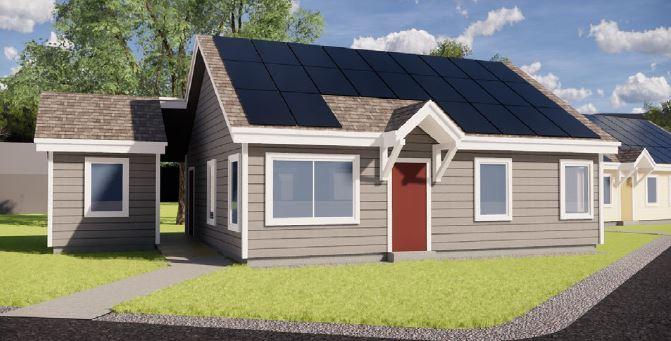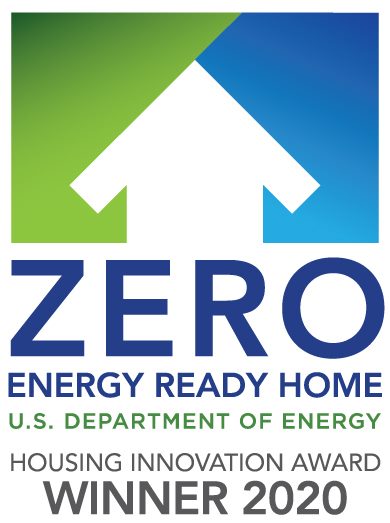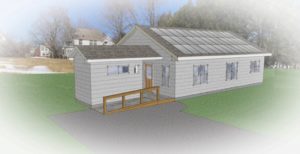Pioneer Valley Habitat for Humanity’s house at 1 Garfield Ave. in Florence was recently recognized by Habitat for Humanity International (HFHI) with the Best in Sustainability award at the 2020 Habitat House Design Contest. As a contest winner, Pioneer Valley Habitat will receive a grant from Habitat for Humanity International to continue the affiliate’s work building affordable homes in partnership with local families in Hampshire and Franklin counties.
Every year, the contest recognizes Habitat for Humanity affiliates who exemplify the Habitat commitment to “high-quality housing that is safe and affordable for the long-term, as well as strategies that advance shelter technology toward building more and building better.” Pioneer Valley Habitat’s build was chosen from among 100 submissions for exemplifying a sustainable approach to affordable housing that can be replicated by other Habitat affiliates.
1 Garfield Ave. was designed by Jones Whitsett Architects, and was completed in 2019. This unique small house project of only 625 square feet cost less than $70,000 in materials. Well-insulated and powered by the sun, the home is designed for a single adult or couple with potential for the addition of a second bedroom. With a HERS index rating of 8 the home is anticipated to cost only $238 a year in utilities. JWA worked with PVHH as a part of our firm’s commitment to dedicate 1% of our professional hours to pro-bono work in our local community. Designer Molly Clark and Principal Dorrie Brooks led the project, creating a set of documents expressly designed for non-professional builders and volunteers; documents which are now available to other chapters of Habitat for Humanity International.
“Our local communities in the Valley are facing a critical shortage of affordable housing that has been growing more dire every year. Our firm volunteered to design the project and brought our entire staff out to do a Team Build in order to learn what we could from Habitat about efficient home construction. We know it’s going to take new models of design, financing and construction to achieve the volume highly sustainable small homes our neighbors needs to thrive.” – Dorrie Brooks, Principal, Jones Whitsett Architects.
1 Garfield Ave. is also the pilot home for Pioneer Valley Habitat’s Big Enough Project, funded by the Community Foundation of Western Mass. The project aims to revolutionize how we think about homeownership in Franklin and Hampshire counties by advocating for and building simple, durable, and affordable small homes. Pioneer Valley Habitat has since completed three other “big enough” homes and more are in progress; all have a goal of utilizing innovative building techniques to maximize energy efficiency, preserving long-term affordability for homeowners by lowering operating costs.
To learn more about 1 Garfield Ave. and the Big Enough Project, visit www.pvhabitat.org/big-enough, read the 2020 Big Enough Report, or watch the foundation-to-finish documentary.
About Jones Whitsett Architects
Jones Whitsett Architects provides comprehensive design services in education, housing and civic architecture. With over 36 years of experience, a talented staff of architects and a commitment to ethical and sustainable design, JWA is well-known for its work in public architecture projects throughout Western Massachusetts. To learn more, visit www.joneswhitsett.com.



